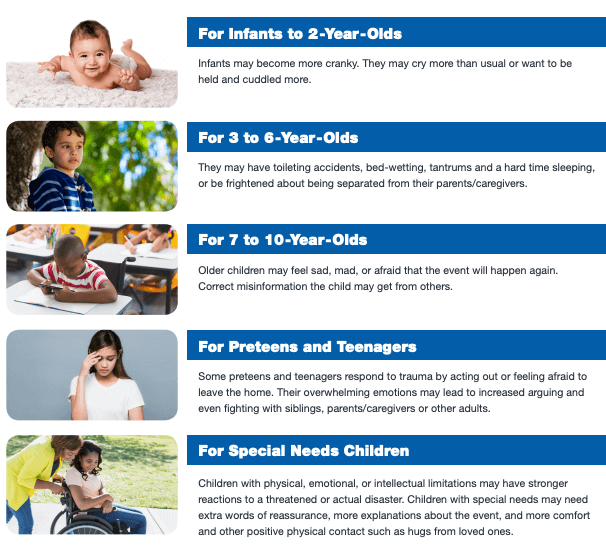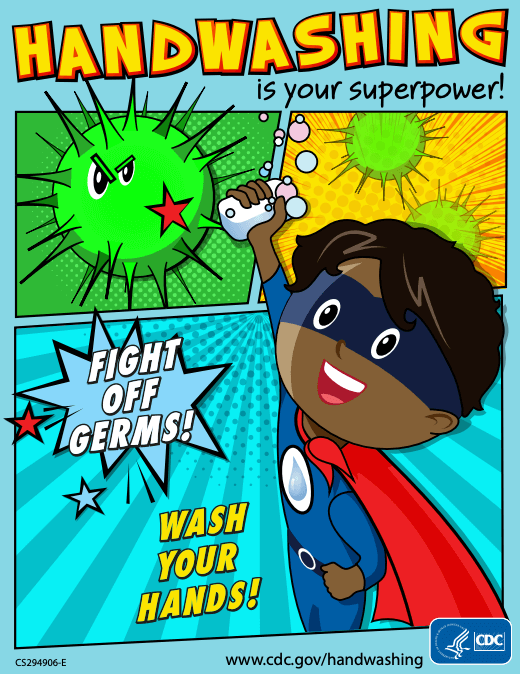Student Stress: COVID-19

What Does Stress Look Like?
A new schedule. Restricted access to friends. Living in close quarters. With schools closed it’s tough for students to adjust. Now add the disappointment of cancelling the school dance, concerns about college applications, and sports and school clubs closing down…
It’s no wonder some kids are having a hard time. But what you may also be seeing is stress — not exactly related to the new schedule and restrictions but to how our world has changed because of the pandemic.
Students show stress in different ways at different ages. The Centers for Disease Control and Prevention (CDC) gives examples of what to look for and how to help.
Talking to Kids about the Pandemic
Giving your children age-appropriate accurate information about COVID-19 is important in addressing the fears and stress they are feeling. Like grownups, they may be worried that they will get the virus or that members of their family will become ill. The CDC recommends:
- Talk. "Share facts about COVID-19 in a way that your child or teen can understand."
- Feel. "Let them know it is ok if they feel upset. Share with them how you deal with your own stress so that they can learn how to cope from you."
- Empathize. "Children may misinterpret what they hear and can be frightened about something they do not understand. Limit your family’s exposure to news coverage of the event, including social media."
- Keep routines. "Try to keep up with regular routines. If schools are closed, create a schedule for learning activities and relaxing or fun activities." (See Ed100 blog Learning at Home, 2020)
- Be a role model. "Take breaks, get plenty of sleep, exercise, and eat well. Connect with your friends and family members."
This video from the the Child Mind Institute offers practical strategies about how to successfully have that talk with your children. Among the tips: Don't be afraid to discuss the virus. Focus on what you can do to be safe.
The Child Mind Institute also provides Facebook Live video chats with expert clinicians (7:00am and 1:30pm Pacific time) and Daily tips for parenting during the crisis, via email.
Finding the right words to use with children in times of stress can be hard. Language for Parents During Times of Worry offers these suggestions: Use words such as “I Care” or “I notice” or “How Can I Help?" Crucially: after you ask a question, listen.
Give Kids Tools to Take Control
Child trauma experts at the Child Trends and the Child Trauma Training Center at the University of Massachusetts say having a sense of control is important in times of fear. Children can do this by helping themselves:
"For example, children can help by following safety guidelines (e.g., washing their hands), preparing for home confinement (e.g., helping to cook and freeze food), or volunteering in the community (e.g. ... sharing extra supplies with a neighbor)."
Parents can explain how and when to wash hands, why you should cough into your elbow and why it is important to keep a distance away from others.
The Brain Pop Coronavirus site for older kids can help with this message. It includes quizzes, extra readings and worksheets.
Another way to give older kids a sense of control is to enlist them in forming and refining safe habits. For example, safe handling of groceries involves new procedures. This popular video from the CDC suggests that you imagine what you would do if your groceries came from the store covered in glitter.
If you have more technical questions about the virus, Boston Children's Hospital offers a short video by Dr. Kristen Moffitt, an expert on infectious disease. The video, which addresses medical questions about the new coronavirus in babies and children, is suitable to share with late elementary students as well as middle and high school students.
What's Age Appropriate?
The Parent Guide from the National Association of School Psychologists and the National Association of School Nurses includes examples of age appropriate conversations. They vary from simple explanations for elementary school students to helping direct high school students to reliable sources of information.
| Additional Resources |
|
|---|---|
For Parents |
Guidance for Parents Experiencing Stress over COVID-19 from the American Academy of Pediatrics recommends parents seek help for themselves, and use positive discipline techniques like time outs, redirection and reinforcement of good behaviors |
The Guide to Well-Being During Coronavirus from the Greater Good Science Center at UC Berkeley provides a variety of articles on well-being. |
|
Many school districts provide School Wellness Centers when school is open. You might want to check with your own district to find out what services, if any, are still available through distance learning. |
|
Multilingual |
For those wanting to listen to basic information in both English and Spanish, check out Coronavirus (COVID-19): How to Talk to Your Child. |
You can find a variety of multilingual resources on the Coronavirus here. |
|
Spanish-language info about COVID-19 from the CDC here. |
|
For Students |
Meditation Apps for Kids from Common Sense Media |
Apps to Help with Mental Health from Common Sense Media |
|
Coping After a Disaster A Ready Wrigley activity book for children age 3-10 |
|
Be well. Be Safe.
Tags on this post
Health PandemicAll Tags
A-G requirements Absences Accountability Accreditation Achievement gap Administrators After school Algebra API Arts Assessment At-risk students Attendance Beacon links Bilingual education Bonds Brain Brown Act Budgets Bullying Burbank Business Career Carol Dweck Categorical funds Catholic schools Certification CHAMP Change Character Education Chart Charter schools Civics Class size CMOs Collective bargaining College Common core Community schools Contest Continuous Improvement Cost of education Counselors Creativity Crossword CSBA CTA Dashboard Data Dialogue District boundaries Districts Diversity Drawing DREAM Act Dyslexia EACH Early childhood Economic growth EdPrezi EdSource EdTech Education foundations Effort Election English learners Equity ESSA Ethnic studies Ethnic studies Evaluation rubric Expanded Learning Facilities Fake News Federal Federal policy Funding Gifted Graduation rates Grit Health Help Wanted History Home schools Homeless students Homework Hours of opportunity Humanities Independence Day Indignation Infrastructure Initiatives International Jargon Khan Academy Kindergarten LCAP LCFF Leaderboard Leadership Learning Litigation Lobbyists Local control Local funding Local governance Lottery Magnet schools Map Math Media Mental Health Mindfulness Mindset Myth Myths NAEP National comparisons NCLB Nutrition Pandemic Parcel taxes Parent Engagement Parent Leader Guide Parents peanut butter Pedagogy Pensions personalized Philanthropy PISA Planning Policy Politics population Poverty Preschool Prezi Private schools Prize Project-based learning Prop 13 Prop 98 Property taxes PTA Purpose of education puzzle Quality Race Rating Schools Reading Recruiting teachers Reform Religious education Religious schools Research Retaining teachers Rigor School board School choice School Climate School Closures Science Serrano vs Priest Sex Ed Site Map Sleep Social-emotional learning Song Special ed Spending SPSA Standards Strike STRS Student motivation Student voice Success Suicide Summer Superintendent Suspensions Talent Taxes Teacher pay Teacher shortage Teachers Technology Technology in education Template Test scores Tests Time in school Time on task Trump Undocumented Unions Universal education Vaccination Values Vaping Video Volunteering Volunteers Vote Vouchers Winners Year in ReviewSharing is caring!
Password Reset
Search all lesson and blog content here.
Login with Email
We will send your Login Link to your email
address. Click on the link and you will be
logged into Ed100. No more passwords to
remember!
















Questions & Comments
To comment or reply, please sign in .
jroubanis April 1, 2020 at 11:50 am